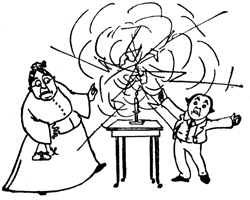Richmond Read-along 94

Welcome back to the Richmond Read-along! Today’s poem is from Hilaire Belloc. A controversial figure who never shied away from an argument, Belloc wrote novels, essays, questionable histories, travel writing, literary criticism, and poetry. He was born in France but spent most of his life in England. His opinions were predominantly informed by his staunch Catholicism and his belief in a romanticised, Catholic past, where everyone lived in harmony on their own smallholdings. His belief in this past coloured his political views, which in turn strongly influenced his close friend Chesterton, who idolised Belloc despite the men’s apparent difference in temperament. Highly critical of both capitalism and socialism, Belloc’s imagined past could be recaptured by his proposed “Distributism,” a political theory based on the equal distribution of wealth and resources combined with involved democracy in small, self-determining local areas.
Belloc was widely derided for his views. Many of them were seen as critically old-fashioned; some of his views have since been vindicated, like his anti-colonialism; others have been used to prove his bigotry and obsolescence, like his anti-semitism and opposition to women’s suffrage. Partly due to this and to his reputation as a fractuous man who would create a feud with anyone, many of Belloc’s works have fallen out of fashion. However, his verse – particularly his comic verse – has remained popular. His so-called children’s verse, which much like Lear and Carroll‘s appeals to adults at least as strongly as children, has always been especially popular. However his other verse is also well received, such as the grand “Heroic Poem in Praise of Wine.” Critics of the day acknowledged his brilliance as a light-hearted poet in contrast to his miserable reputation, and this divided opinion has remained to some extent constant. Belloc was also cited in a Monty Python sketch as a famous mouse.
George, Who played with a Dangerous Toy, and suffered a Catastrophe of considerable Dimensions.
When George’s Grandmamma was told
That George had been as good as Gold,
She Promised in the Afternoon
To buy him an Immense BALLOON.
And so she did; but when it came,
It got into the candle flame,
And being of a dangerous sort
Exploded with a loud report!
The Lights went out! The Windows broke!
The Room was filled with reeking smoke.
And in the darkness shrieks and yells
Were mingled with Electric Bells,
And falling masonry and groans,
And crunching, as of broken bones,
And dreadful shrieks, when, worst of all,
The House itself began to fall!
It tottered, shuddering to and fro,
Then crashed into the street below—
Which happened to be Savile Row.
When Help arrived, among the Dead
Were Cousin Mary, Little Fred,
The Footmen (both of them), The Groom,
The man that cleaned the Billiard-Room,
The Chaplain, and The Still-Room Maid.
And I am dreadfully afraid
That Monsieur Champignon, the Chef,
Will now be permanently deaf—
And both his Aides are much the same;
While George, who was in part to blame,
Received, you will regret to hear,
A nasty lump behind the ear.
MORAL
The moral is that little Boys
Should not be given dangerous Toys.
You can find this poem, along with the rest of the “Cautionary Tales for Children,” on Project Gutenberg. Richmond upon Thames Borough Library members can read more about Belloc in the Oxford Dictionary of National Biography.
Join us tomorrow for the next Richmond Read-along!
